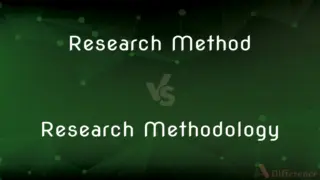Will vs. Going To — What's the Difference?
Edited by Tayyaba Rehman — By Fiza Rafique — Published on October 1, 2023
"Will" expresses a future intention, prediction, or spontaneous decision, while "Going To" indicates a future plan or something seen as inevitable.

Difference Between Will and Going To
Table of Contents
ADVERTISEMENT
Key Differences
"Will" is a modal auxiliary verb that conveys various future scenarios, be it an intention, prediction, or spontaneous decision. Conversely, "Going To" is a phrase denoting a future plan or action that's perceived as sure based on current evidence.
While both "Will" and "Going To" refer to future events, "Will" is often used when the decision is made at the moment of speaking. "Going To," on the other hand, typically relates to decisions made before the time of speaking or observable future events.
Linguistically, "Will" is more concise and can stand alone with numerous verbs. "Going To" requires the verb "to be" and another main verb, making its structure slightly more complex.
The distinction between "Will" and "Going To" can sometimes be subtle. For instance, predictions without evidence use "Will," like "I think it will rain." In contrast, predictions with evidence employ "Going To," such as "Look at those clouds! It's going to rain."
In informal conversations, especially in American English, the differences between "Will" and "Going To" are often blurred, and they might be used interchangeably. However, understanding their nuanced differences can add precision to one's language usage.
ADVERTISEMENT
Comparison Chart
Function
Indicates future intentions, predictions, or spontaneous decisions.
Denotes planned future actions or events seen as inevitable based on evidence.
Structure
Pairs directly with verbs.
Requires "to be" + main verb.
Typical Usage
Decisions made at the moment of speaking.
Pre-decided plans or decisions.
Evidence Requirement
No evidence required.
Often based on evidence or current observations.
Formal vs. Informal
Common in both formal and informal speech.
More common in informal speech.
Compare with Definitions
Will
"Will" indicates a future action or occurrence.
I will visit the museum tomorrow.
Going To
"Going To" predicts a future event based on current evidence.
Look at the sky; it's going to rain.
Will
"Will" is used to express spontaneous decisions.
I will have a coffee, thanks.
Going To
"Going To" signifies a future plan.
I'm going to start exercising regularly.
Will
"Will" denotes a promise or commitment.
I will always support you.
Going To
"Going To" often reflects an intention or resolution.
She's going to learn Spanish this year.
Will
The mental faculty by which one deliberately chooses or decides upon a course of action
Championed freedom of will against a doctrine of predetermination.
Going To
"Going To" can imply inevitability.
With that attitude, you're going to face challenges.
Will
Diligent purposefulness; determination
An athlete with the will to win.
Going To
"Going To" represents a decision made before the moment of speaking.
We're going to watch a movie tonight.
Will
Self-control; self-discipline
Lacked the will to overcome the addiction.
Going To
(countable) Promised future actions or achievements.
Will
A desire, purpose, or determination, especially of one in authority
It is the sovereign's will that the prisoner be spared.
Will
Deliberate intention or wish
Let it be known that I took this course of action against my will.
Will
Free discretion; inclination or pleasure
Wandered about, guided only by will.
Will
Bearing or attitude toward others; disposition
Full of good will.
Will
A legal declaration of how a person wishes their personal possessions to be disposed of after death.
Will
A legally executed document containing this declaration.
Will
To decide on or intend
He can finish the race if he wills it.
Will
To yearn for; desire
“She makes you will your own destruction” (George Bernard Shaw).
Will
To decree, dictate, or order
Believed that the outcome was willed by the gods.
Will
To induce or try to induce by sheer force of will
We willed the sun to come out.
Will
To grant in a legal will; bequeath
Willed his fortune to charity.
Will
To order to direct in a legal will
She willed that her money be given to charity.
Will
To exercise the will.
Will
To make a choice; choose
Do as you will.
Will
To wish; desire
Do what you will. Sit here if you will. See Usage Note at shall.
Will
(auxiliary) Used to express the future tense, sometimes with some implication of volition when used in the first person. Compare shall.
One of our salesmen will visit you tomorrow.
I will pass this exam.
Will
(auxiliary) To be able to, to have the capacity to.
Unfortunately, only one of these gloves will actually fit over my hand.
Will
(auxiliary) Expressing a present tense with some conditional or subjective weakening: "will turn out to", "must by inference".
He will be home by now. He always gets home before 6 o'clock.
I can't find my umbrella. I will have forgotten it home this morning.
Will
(auxiliary) To habitually do (a given action).
Boys will be boys.
Will
(auxiliary) To choose or agree to (do something); used to express intention but without any temporal connotations (+ bare infinitive), often in questions and negation.
Will you marry me?
I’ve told him three times, but he won’t take his medicine.
Will
To wish, desire (something).
Do what you will.
Will
To wish or desire (that something happen); to intend (that).
Will
(archaic) Implying will go.
Will
To instruct (that something be done) in one's will.
Will
(transitive) To bequeath (something) to someone in one's will (legal document).
He willed his stamp collection to the local museum.
Will
(transitive) To exert one's force of will (intention) in order to compel, or attempt to compel, something to happen or someone to do something.
All the fans were willing their team to win the game.
Will
One's independent faculty of choice; the ability to be able to exercise one's choice or intention.
Of course, man's will is often regulated by his reason.
Will
The act of choosing to do something; a person’s conscious intent or volition.
Most creatures have a will to live.
Will
One's intention or decision; someone's orders or commands.
Eventually I submitted to my parents' will.
Will
Firmity of purpose, fixity of intent
Will
(law) A formal declaration of one's intent concerning the disposal of one's property and holdings after death; the legal document stating such wishes.
Will
(archaic) That which is desired; one's wish.
Will
(archaic) Desire, longing. (Now generally merged with later senses.)
He felt a great will to make a pilgrimage to the Holy Land.
Will
The power of choosing; the faculty or endowment of the soul by which it is capable of choosing; the faculty or power of the mind by which we decide to do or not to do; the power or faculty of preferring or selecting one of two or more objects.
It is necessary to form a distinct notion of what is meant by the word "volition" in order to understand the import of the word will, for this last word expresses the power of mind of which "volition" is the act.
Will is an ambiguous word, being sometimes put for the faculty of willing; sometimes for the act of that faculty, besides [having] other meanings. But "volition" always signifies the act of willing, and nothing else.
Appetite is the will's solicitor, and the will is appetite's controller; what we covet according to the one, by the other we often reject.
The will is plainly that by which the mind chooses anything.
Will
The choice which is made; a determination or preference which results from the act or exercise of the power of choice; a volition.
The word "will," however, is not always used in this its proper acceptation, but is frequently substituted for "volition", as when I say that my hand mover in obedience to my will.
Will
The choice or determination of one who has authority; a decree; a command; discretionary pleasure.
Thy will be done.
Our prayers should be according to the will of God.
Will
Strong wish or inclination; desire; purpose.
My poverty, but not my will, consents; . . . Put this in any liquid thing you will,And drink it off.
Will
That which is strongly wished or desired.
What's your will, good friar?
The mariner hath his will.
Will
Arbitrary disposal; power to control, dispose, or determine.
Deliver me not over unto the will of mine enemies.
Will
The legal declaration of a person's mind as to the manner in which he would have his property or estate disposed of after his death; the written instrument, legally executed, by which a man makes disposition of his estate, to take effect after his death; testament; devise. See the Note under Testament, 1.
Will
To wish; to desire; to incline to have.
A wife as of herself no thing ne sholde [should]Wille in effect, but as her husband wolde [would].
Caleb said unto her, What will thou ?
They would none of my counsel.
Will
As an auxiliary, will is used to denote futurity dependent on the verb. Thus, in first person, "I will" denotes willingness, consent, promise; and when "will" is emphasized, it denotes determination or fixed purpose; as, I will go if you wish; I will go at all hazards. In the second and third persons, the idea of distinct volition, wish, or purpose is evanescent, and simple certainty is appropriately expressed; as, "You will go," or "He will go," describes a future event as a fact only. To emphasize will denotes (according to the tone or context) certain futurity or fixed determination.
I am able to devote as much time and attention to other subjects as I will [shall] be under the necessity of doing next winter.
A countryman, telling us what he had seen, remarked that if the conflagration went on, as it was doing, we would [should] have, as our next season's employment, the Old Town of Edinburgh to rebuild.
I feel assured that I will [shall] not have the misfortune to find conflicting views held by one so enlightened as your excellency.
Will
To be willing; to be inclined or disposed; to be pleased; to wish; to desire.
And behold, there came a leper and worshiped him, saying, Lord if thou wilt, thou canst make me clean. And Jesus . . . touched him, saying, I will; be thou clean.
Will
To form a distinct volition of; to determine by an act of choice; to ordain; to decree.
By all law and reason, that which the Parliament will not, is no more established in this kingdom.
Two things he [God] willeth, that we should be good, and that we should be happy.
Will
To enjoin or command, as that which is determined by an act of volition; to direct; to order.
They willed me say so, madam.
Send for music,And will the cooks to use their best of cunningTo please the palate.
As you go, will the lord mayor . . . To attend our further pleasure presently.
Will
To give or direct the disposal of by testament; to bequeath; to devise; as, to will one's estate to a child; also, to order or direct by testament; as, he willed that his nephew should have his watch.
Will
To exercise an act of volition; to choose; to decide; to determine; to decree.
At Winchester he lies, so himself willed.
He that shall turn his thoughts inward upon what passes in his own mind when he wills.
I contend for liberty as it signifies a power in man to do as he wills or pleases.
Will
The capability of conscious choice and decision and intention;
The exercise of their volition we construe as revolt
Will
A fixed and persistent intent or purpose;
Where there's a will there's a way
Will
A legal document declaring a person's wishes regarding the disposal of their property when they die
Will
Decree or ordain;
God wills our existence
Will
Have in mind;
I will take the exam tomorrow
Will
Determine by choice;
This action was willed and intended
Will
Leave or give by will after one's death;
My aunt bequeathed me all her jewelry
My grandfather left me his entire estate
Will
"Will" conveys future predictions.
It will probably snow in December.
Will
"Will" is employed to offer assistance.
I will carry those bags for you.
Common Curiosities
Is "Will" used for on-the-spot decisions?
Yes, "Will" is typically used for decisions made at the moment of speaking.
Can "Will" and "Going To" be used interchangeably?
While they often overlap, especially in informal speech, each has distinct nuances based on spontaneity, evidence, and planning.
Can "Going To" convey intentions?
Yes, "Going To" often reflects a person's intention or resolution for the future.
What does "Going To" generally represent?
"Going To" often denotes planned future actions or events viewed as inevitable based on current evidence.
Does "Will" need evidence for predictions?
No, "Will" can predict future events without current evidence, like "I think it will be sunny."
How do I use "Going To" for predictions?
Predictions with "Going To" often rely on present evidence, like "It's going to rain because the sky is cloudy."
What does "Will" typically indicate?
"Will" primarily suggests future intentions, predictions, or spontaneous decisions.
How do you structure a "Going To" sentence?
"Going To" requires the verb "to be" followed by "going to" and another verb, e.g., "She is going to travel."
How do I negate "Will"?
Use "will not" or the contraction "won't."
Is "Going To" more informal than "Will"?
"Going To" is common in both formal and informal settings, but it's more prevalent in casual conversations.
Is "Will" more versatile than "Going To"?
"Will" can be paired with various verbs and used in diverse contexts, making it slightly more versatile than "Going To."
How is "Going To" negated?
Combine "not" with the "to be" verb, e.g., "She's not going to come."
Is "Will" always about the future?
Primarily, yes, but it can also express desires, requests, or commands, like "Will you open the window?"
Are both "Will" and "Going To" related to future actions?
Yes, both phrases primarily address future events or actions, but with different nuances.
Which one is used for sure plans?
"Going To" is typically used for plans perceived as certain or already decided.
Share Your Discovery

Previous Comparison
Research Method vs. Research Methodology
Next Comparison
Hygroscopic vs. DeliquescentAuthor Spotlight
Written by
Fiza RafiqueFiza Rafique is a skilled content writer at AskDifference.com, where she meticulously refines and enhances written pieces. Drawing from her vast editorial expertise, Fiza ensures clarity, accuracy, and precision in every article. Passionate about language, she continually seeks to elevate the quality of content for readers worldwide.
Edited by
Tayyaba RehmanTayyaba Rehman is a distinguished writer, currently serving as a primary contributor to askdifference.com. As a researcher in semantics and etymology, Tayyaba's passion for the complexity of languages and their distinctions has found a perfect home on the platform. Tayyaba delves into the intricacies of language, distinguishing between commonly confused words and phrases, thereby providing clarity for readers worldwide.
















































